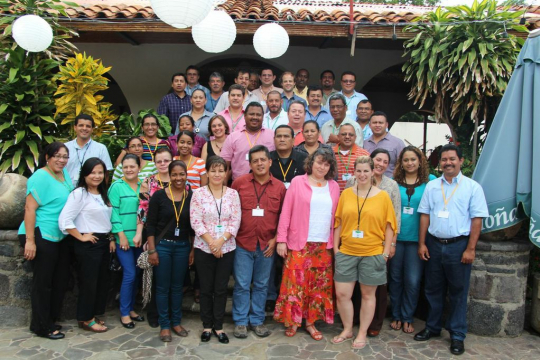Economics of REDD+ capacity building and interactions
EfD-CA Research fellow lectured about payment for ecosystem services and its relation to REDD+ as well on negotiation strategies to achieve self-sustained agreements.
Granada, the beautiful colonial city in Nicaragua, was selected by the Sustainable Management of Natural Resources Project (GESOREN) to conduct a five day workshop on the Economics of REDD+ in conjunction with the German Agency for International Cooperation (GIZ). One of the core components of the project focuses on advising government institutions and non-governmental actors on developing a coherent, institutional and legal framework for Reducing Emissions from Deforestation and Degradation (REDD).
To this end more than 35 people from Dominican Republic, Guatemala, Honduras, Nicaragua, Costa Rica, Panama, and Ecuador participated in the workshop which took place between the 1 and 5 of July, 2013. Participants included representatives of indigenous communities, civil servants from various government agencies, NGOs, and private consultants; people who are actively involved in REDD+ processes, forestry, and conservation in their countries.
EfD-CA fellow, Carlos L. Muñoz Brenes was invited to lecture on the economics of payments for ecosystem services (PSE) and practical applications of PSE agreements. He also collaborated in conducting a simulation of a negotiation of a REDD+ agreement. Carlos has extensive theoretical and practical experiences in both topics and are of his research work at EfD-CA.
In addition to PSE and negotiations the program of the workshop included a series of lectures that were developed by other instructors and guest lectures. Some of the topics focused on benefit sharing and instructional aspects of REDD+; the importance of REDD+ for Central America and the Caribbean; and issues around the economics of REDD+ such as cost-benefit analysis, opportunity costs. All of these issues were put in practice in the negotiations simulation game that took place the last day of the workshop.
For Rhena Hoffman (GIZ-GESOREN) “understanding the foundations of economics and environmental economics in particular, is central to REDD+ and its development”. In addition, “we are glad to be able to contribute to building capacity in Latin America on this important issue by promoting activities like this workshop and providing a place where people who are interested in these topics can interact”, said Hoffman.
